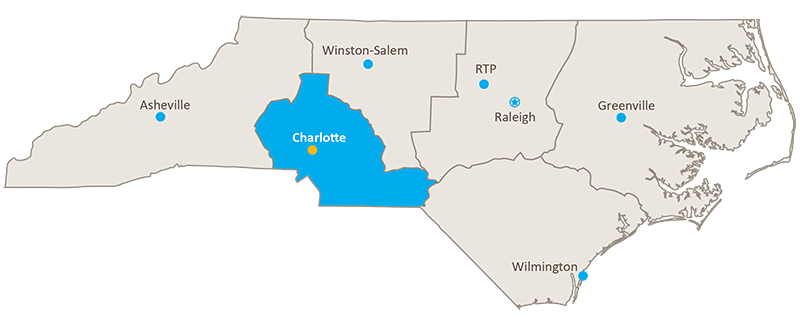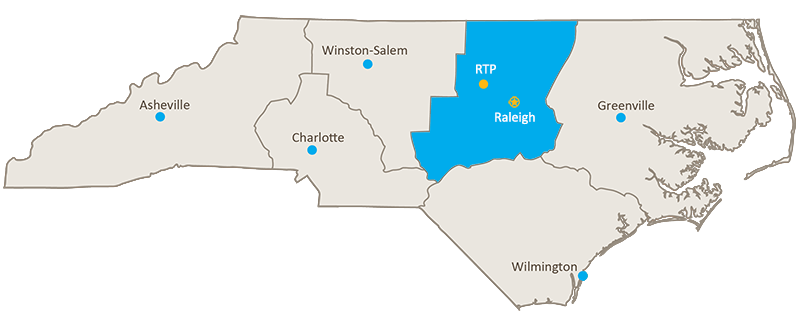
Shared Research Facilities and Equipment
Many facilities across North Carolina support life sciences research.
The listing covers core laboratory facilities at university and nonprofit research institutions that are open to researchers or collaborators outside of their home institutions.
Representatives of the core facilities listed below have voluntarily submitted their information. Not all institutions list available core lab facilities, but many are in the process of organizing and compiling these resources. As this information becomes available, we'll add those links.
NCBiotech has funded equipment in many core facilities in the state.
The Center's ongoing role is to provide this information portal. If you would like to submit a new listing or update an existing listing please fill this form.
The DHMRI bridges the research gap between academia and industry by providing applied R&D solutions for agriculture, nutrition, and health researchers in a customer-based, flexible, and collaborative environment. DHMRI applies a trans-disciplinary approach to solve complex biological problems. Areas of concentration include: Metabolomics, Proteomics, Genomics, Immunology, Cell and Biochemistry, and Bioinformatics. The DHMRI also maintains a state-of-the-art microscope suite which includes a Confocal Laser Scanning Microscope 710, Multiphoton NLO, a PALM Laser Microdissection system as well as several other microscope platforms. In addition, the facility maintains a 40k sq. foot AALAC-approved vivarium for small and large animal work. Collaborators range from academia to start-ups to Fortune 100 companies. Flexible business model from fee for service to shared risk.
700 and 950 MHz NMRs, Next-Gen Sequencing, Genomics, Epigenetics, RNA analysis, Analytical Chemistry, Proteomics and Protein Chemistry, Metabolomics, and Flow Cytometry.
- Biostatistics, Bioinformatics, & HPC
- Cell/Tissue Culture & Flow Cytometry
- Human Performance, Nutrition, & Physiology
- Crystallography, X-ray Diffraction, NMR, & EPR
- Genetics & Genomics
- Imaging & Microdissection
- Other -omics & Analytical
The Department of Chemistry Mass Spectrometry Core Laboratory enables innovative research at UNC-Chapel Hill by providing equipment, expertise and training in small molecule applications utilizing mass spectrometry in an open-access facility. We specialize in small molecule mass spectrometry.
We proactively build relationships with UNC departments and researchers (both internal and external) to acquire, support and operate mass spectrometry capabilities that are critical for their current and future research success.
high resolution
accurate mass
metabolomics
lipidomics
quantitative mass spectrometery
mass spectrometry
- Other -omics & Analytical
XCL primarily functions as a service crystallographic facility for the University and are actively collaborating with Department of Chemistry, Inorganic, Organic, and Material Division, Physics and Astronomy, biology, as well as the School of Pharmacy and the School of Medicine. The facility houses three single Crystal X-ray diffractometers, Bruker D8 VENTURE with dual sources (Copper Diamond/microfocus Moly), Bruker Kappa Apex II with Moly radiation, and Bruker SMART Apex II with copper radiation, which are fully maintained by the XCL Director. Service includes SC-XRD structure determination and various PXRD techniques, and user training is available for both SC- and powder XRD techniques. XCL is currently working to enable the MicroED with the use of CryoEM. Please email for detail.
Additional experiments at Argonne National Laboratory, SCrAPS – Synchrotron Crystallography at Advanced Photon Source, are carried out three times a year for samples that diffract too weakly using the conventional radiation source at the facility. XCL provides both client- and user-based services where clients enjoy the convenience of the service, and users gain privilege and flexibilities in instrument operation, data collection, and structure solution and refinement with or without the assistance of the XCL personnel. To become a proficient user, requirements such as passing the X-ray Crystallography course as well as instrument-specific and safety training and exams need to be fulfilled.
small molecule single crystal crystallography
protein crystal screening
Protein crystallography
MicroED
- Crystallography, X-ray Diffraction, NMR, & EPR
The Immune Profiling Core offers fee for service sample processing, cryopreservation, biobanking, and immunological assays such as flow cytometry, luminex, ELISpot, and ELISA. In addition, Core staff offer guidance in support of grant/contract applications as well as assay/study design, training and mentoring.
GCLP compliant, Study design, Scientific writing in support of grants/contracts/manuscripts, Sample processing, Viable cryopreservation, Biorepository, Immune Profiling, Flow Cytometry, Data analysis
- Bioprocessing
- Biorepository
- Biostatistics, Bioinformatics, & HPC
- Cell/Tissue Culture & Flow Cytometry
We provide light microscopy, laser scanning confocal microscopy, and electron microscopy (TEM & SEM) equipment and technical support to ASU and western North Carolina. See policy at: http://www.casmifa.appstate.edu/Policies.html
Optical microscopy imaging, Laser scanning confocal microscopy imaging, scanning electron microscopy (SEM) imaging, and transmission electron microscopy (TEM) imaging, and SEM/TEM x-ray elemental analysis.
- Imaging & Microdissection
The Duke Chemistry Shared Instrumentation Facility houses modern and diverse instrumentation for a range of analytical needs, including mass spectrometry, nuclear magnetic resonance, and a variety of supporting instruments. Most shared instruments are available for walk-up use by Duke researchers once they have received the required training. Reservations for instruments can be made online by qualified users once they have been provided access to the instrument calendars by the Facility Director.
mass spectrometry, NMR, optical spectroscopy
- Other -omics & Analytical
The DFGSR provides infrastructure and expertise for the implementation of CRISPR and RNAi-based technologies, both small- and genome-scale. We also provide compound screening services and high-throughput assay development. Open to non-Duke investigators.
siRNA/shRNA screening, CRISPR screening, custom CRISPR services, chemical screening, high-content screening, Labcyte Echo Acoustic Dispenser, Velocity11 liquid handling system, CX5 HCS, BMG Clariostar multimodal plate reader
- Genetics & Genomics
- Pharmaceutical & Drug Discovery
The Duke Microbiome Shared Resource provides a centralized resource hub to enhance the existing interactions with the Duke Microbiome Center, Duke Cancer Institute, and Genomic and Computational Biology shared resources to address the role of microbial systems in human healthcare, food production and environmental restoration. This resource will provide access to a variety of services that will enable researchers to focus on microbial communities (bacteria, fungi and virus), immune oncology, cancer research and infectious disease.
Microbiome profiling including assistance with experimental design, sample collection, sample processing, amplicon, metagenomic and metatranscriptomic sequencing. We also provide access to the NanoString technology for gene expression profiling.
- Genetics & Genomics
Duke MGC uses state-of-the-art technology to offer a variety of experimental platforms to facilitate genomics research for single-cell and spatial omics, DNA genotyping and methylation, and Simoa® bead-based immunoassays.
Simoa® bead-based immunoassay technology, spatial, in situ, immunoassay, RNA, protein
- Genetics & Genomics
The Neurotransgenic Laboratory (NTL) at Duke University conducts technology development research and provides services and training towards the genetic analysis of the nervous system. The nervous system with its vast diversity of cell types and synaptic connections requires sophisticated tools to visualize and modify neuronal activity and interactions. Genetically engineered reporters and effectors allow such precise modifications. The Neurotransgenic Laboratory is focused on the design and generation of genetic tools for neuroscience research. Such tools include viruses for the precise stereotactical application of transgenes, plasmids and BACs for the generation of transgenic animals, genetically modified embryonic and induced pluripotent stem cells for differentiation and transplantation studies as well as for the generation of genetically modified animals. The NTL offers coordinated expertise in the generation of genetic tools for neuroscience research (")from concept through creation("), including experimental project design and planning, molecular construct preparation, high titer virus production, stem cell modifications, and mouse embryo microinjections. Ultimately, the mission of the NTL is to provide an enriched environment for students, trainees, and established investigators and to develop, promote, and enhance the use of sophisticated genetic tools for understanding and resolving biomedical problems in basic and translational neuroscience research.
project design, molecular biology, Viral Vectors, ES Cell Targeting, Zygote Injections, Blastocyst Injections
- Genetics & Genomics
- Model Systems
- Viral Vectors







